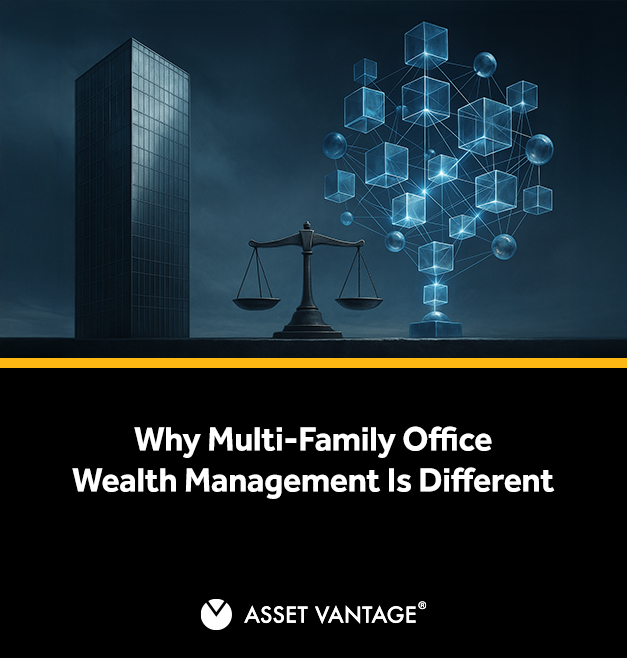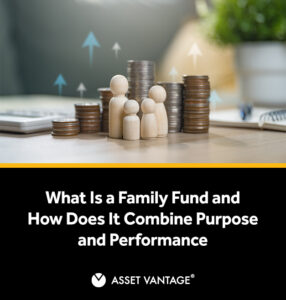Read Time12 Mins
- Why Multi-Family Office Wealth Management Is Different
- Comparing Wealth Management Models
- Core Services in Multi-Family Office Wealth Management
- Decision Making and Family Governance
- When Multi-Family Office Wealth Management Makes Sense
- Fee Structures and Cost Considerations
- Choosing a Multi-Family Office
- The Future of Wealth Management in Multi-Family Offices
Why Multi-Family Office Wealth Management Is Different
- Comprehensive financial services include investment management, investment advisory, and asset protection strategies integrated into one framework, with a deep understanding of the family’s entire economic landscape.
- Tax planning and optimization are coordinated with financial advisors and tax advisors to reduce liabilities, ensure compliance with tax laws, and protect the family’s financial affairs.
- Governance and decision-making are supported by family governance structures that align investment strategy, financial management, and lifestyle management with the family’s values.
- Legacy and succession planning provide continuity frameworks that prepare future generations, preserve family dynamics, and safeguard financial security.
- Cost efficiency is achieved through shared reporting platforms, technology, and specialized services that deliver sophisticated financial management without requiring the scale of a single-family office.
Comparing Wealth Management Models
Multi-Family Offices vs Private Banks
Private banks optimize for efficiency and profit. They segment clients by assets under management and push investment products designed for broad distribution. This means:
- Advice is often tied to products and credit lines, not a family’s long-term needs.
- Reporting remains standardized, with little insight into the family’s affairs across entities.
- Governance, succession, or lifestyle support is rarely offered as specific services.
- Independent investment advice spans private equity, hedge funds, and alternative investments, with no obligation to promote bank products.
- Family governance frameworks that formalize decision-making and protect the family’s affairs across generations.
- Integrated tax and estate planning as part of comprehensive financial services.
- Lifestyle management and personalized service, tailored to family members rather than designed for multiple clients at once.
For successful families seeking more than standard wealth management, MFOs offer independence, context-specific services, and visibility across the family’s wealth. Where banks manage portfolios, multi-family offices manage continuity by aligning every decision with long-term legacy.
Multi-Family Offices vs Single-Family Offices
Single-family offices (SFOs) represent the gold standard of control. One family commands a fully dedicated team, bespoke systems, and in-house expertise. This model is viable only when significant wealth, often US$100 million or more, can justify the fixed costs of staff, reporting platforms, and governance infrastructure. Typically, these are ultra-high-net-worth families who require highly specialized and customized solutions.
- Full customization of investment strategy and access to direct private equity and hedge fund opportunities.
- Deep involvement in the family’s financial affairs, from tax planning to succession frameworks.
- Specific services like concierge and lifestyle management are designed exclusively for one family’s needs.
- Cost efficiency through shared reporting platforms, staff, and consolidated infrastructure.
- Specialized services such as investment advisory, tax optimization, and asset protection strategies are provided without requiring SFO-level overhead.
- Sophisticated financial management with governance frameworks tailored to each family’s values and decision-making style.
- Broader investment opportunities via pooled access to alternative investments while retaining independence from bank-driven products.
Why Families Look Beyond Traditional Wealth Management
- Oversight of financial affairs that consolidates reporting, risk management, and asset management across entities.
- Integrated tax planning and estate strategies that protect wealth and improve cost efficiency across generations.
- Legacy planning and succession frameworks that prepare future generations with governance, education, and continuity.
- Family governance structures that embed the family’s values into decision-making and safeguard alignment across multiple clients.
- Specialized services beyond investments include lifestyle management, personalized service, asset protection strategies, and concierge support.
- Broader investment advisory opportunities cover private equity and hedge funds, delivered independently of bank products. Learn more about our participation in global family office conferences and events.
Comparison at a Glance
| Feature / Service | Multi-Family Office (MFO) | Private bank / traditional wealth management | Single-family office (SFO) |
|---|---|---|---|
| Client base | Serves multiple families; shared infrastructure | Serves many clients, segmented by assets under management (AUM) | Serves one family only; fully dedicated |
| Investment management | Independent management; access to private equity, hedge funds, and alternatives | Bank-driven products and model portfolios | Bespoke direct investments and complex structures |
| Governance & decision making | Family governance frameworks: shared but customized processes | Limited governance; shaped by institutional priorities | Fully tailored governance aligned with the family’s values |
| Tax & estate planning | Integrated tax planning, optimization, and estate strategies | Basic tax services; estate planning outsourced | Comprehensive in-house tax advisors and estate planners |
| Legacy & succession | Legacy planning and succession support across generations | Limited succession focus | Deeply embedded succession planning and next-generation education |
| Lifestyle management | Concierge and lifestyle services; highly personalized | Minimal; product- and investment-centric | Fully customized lifestyle support |
| Cost efficiency | Cost-effective; shared staff, reporting, and platforms | Fee-based (AUM or products); often opaque | High fixed cost; requires significant wealth |
| Reporting & technology | Shared digital platforms; consolidated data and risk management | Standardized bank reporting; less transparency across asset classes | Bespoke systems, if funded, will have full control |
| Who it fits | High net worth families seeking comprehensive services without SFO-level costs | Families seeking investment products or credit | Ultra-wealthy families seeking ultimate control |
Core Services in Multi-Family Office Wealth Management
The strength of a multi-family office lies in the range of services it delivers. Families are not just buying investment advice. They are investing in comprehensive financial services that bring together governance, planning, and decision-making to protect wealth across future generations. These services encompass all aspects of the family’s financial affairs, including investment management, tax strategies, estate planning, and philanthropy.
Investment Management and Advisory
Risk Management and Asset Protection Strategies
Investment Opportunities Beyond Private Banks
Tax Planning and Tax Optimization
Legacy Planning and Succession
Lifestyle Management and Personalized Service
Family Wealth Education
Decision Making and Family Governance
- Shared governance frameworks give multiple clients access to proven processes while still reflecting each family’s values.
- Decision-making protocols ensure that financial planning is aligned with long-term goals rather than short-term pressures.
- Family governance systems create clarity on roles, responsibilities, and services provided by advisors, avoiding duplication and confusion.
- Integration with comprehensive financial services connects governance with investment strategy, tax planning, and estate strategies.
- Families gain transparency and accountability in managing their financial affairs.
- Successful families safeguard harmony by embedding rules that balance individual voices with collective goals.
- Governance structures prepare future generations to take part in decision-making with discipline and confidence.
When Multi-Family Office Wealth Management Makes Sense
For High Net Worth Families Seeking Cost Efficiency
For Families Seeking Specialized Services
For Families Focused on Future Generations
Fee Structures and Cost Considerations
- Most MFOs follow a transparent fee structure based on either flat fees or assets under management; flat fees are often calculated based on the management of the family’s wealth.
- Families benefit from transparent pricing that sets expectations upfront.
- Costs are spread across multiple clients, creating cost efficiency that a dedicated office cannot match.
- Families see exactly what services are provided, from investment advisory to estate strategies, without hidden charges.
- The model is cost-effective, providing access to comprehensive financial services at a fraction of the cost of building an in-house system.
- Compared with traditional wealth managers or private banks, where fees can be tied to product sales, MFOs align pricing with service, not distribution.
| Model | Fee Structure | Services Provided | Cost Efficiency | Transparency |
|---|---|---|---|---|
| Multi-Family Office (MFO) | Flat fee or asset-based fee; aligned to the scope of services | Comprehensive financial services, including investment advisory, tax planning, estate strategies, lifestyle management | High costs are shared across multiple families | Clear, itemized; families know exactly what they pay for |
| Private Bank / Traditional Wealth Managers | Fees bundled into products, commissions, and AUM charges | Primarily investment products and limited planning services | Moderate, tied to product sales rather than efficiency | Opaque, difficult to separate the advice from the distribution |
| Single-Family Office (SFO) | Fixed cost of full staff, infrastructure, and systems | Fully bespoke family office services, governance, and continuity | Low, requires significant wealth to justify | Transparent internally, but the high overhead makes the cost disproportionate |
Choosing a Multi-Family Office
An MFO’s investment strategy must align with the family’s values, risk tolerance, and long-term objectives. Strong firms provide independent investment management and advisory services while adapting to the family’s financial management preferences. Personalized service is not optional. It is central to building trust and achieving sustainable results.







